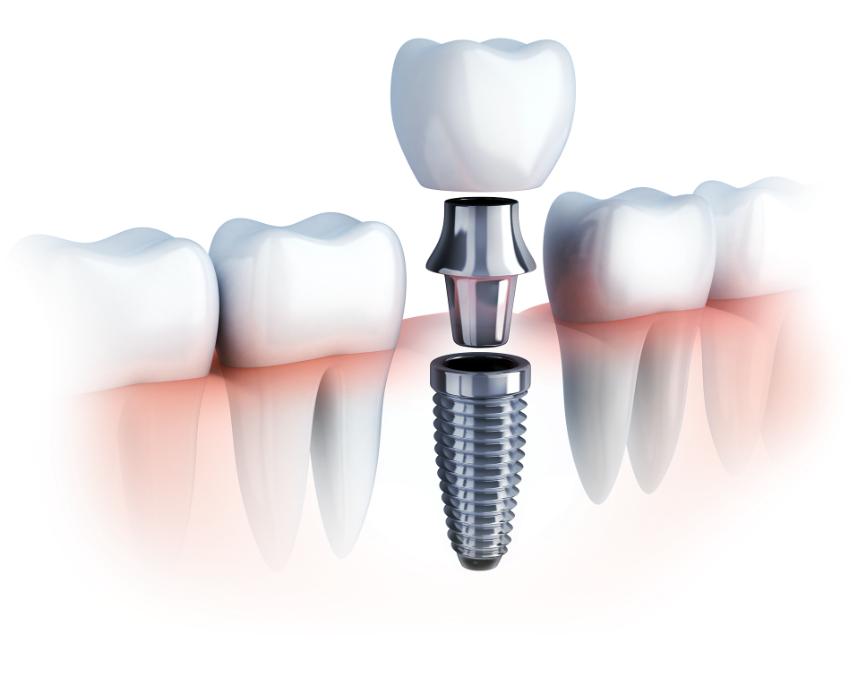More About Dental Sense
The Best Strategy To Use For Dental Sense
Table of ContentsNot known Facts About Dental SenseDental Sense Fundamentals ExplainedThe 3-Minute Rule for Dental SenseSome Ideas on Dental Sense You Should Know
are medical tools operatively dental implanted into the jaw to recover a person's capability to chew or their look. They supply support for synthetic (phony) teeth, such as crowns, bridges, or dentures. When a tooth is lost because of injury or illness, a person can experience problems such as quick bone loss, malfunctioning speech, or changes to eating patterns that cause pain.Oral implant systems include a dental implant body and dental implant abutment and might likewise consist of an abutment fixation screw. Front tooth filling. The oral implant body is surgically placed in the jawbone in area of the tooth's origin. The dental implant abutment is normally affixed to the dental implant body by the abutment addiction screw and expands through gum tissues into the mouth to support the affixed man-made teeth
(http://www.askmap.net/location/7224225/united-states/dental-sense)Framework of The Oral Implant System choosing dental implants, speak to your oral copyright regarding the possible advantages and threats, and whether you are a candidate for the treatment. Points to take into consideration: Your total wellness is an essential consider determining whether you are an excellent prospect for dental implants, for how long it will certainly require to recover, and exactly how long the implant may remain in area.
Smoking cigarettes might impact the recovery process and reduce the lasting success of the dental implant. The recovery process for the dental implant body might take numerous months or longer, during which time you generally have a short-term joint instead of the tooth. the oral implant procedure: Meticulously adhere to the dental health instructions offered to you by your dental copyright.
Rumored Buzz on Dental Sense
Implant failing can lead to the requirement for one more operation to fix or replace the implant system. Brings back the capacity to chew Brings back cosmetic look Aids maintain the jawbone from diminishing because of bone loss Preserves the health and wellness of the surrounding bone and gums Aids maintain adjacent (neighboring) teeth steady Enhances quality of life Damage to bordering all-natural teeth during dental implant positioning Injury to the surrounding tissues throughout surgery, such as sinus perforation Injury during surgical procedure (for instance, fracture of surrounding jawbone) Inadequate feature, such as really feeling like the teeth do not bite with each other normally A sensation that the tooth is loosened or twisting in area resulting from a joint screw loosening Implant body failing (looseness of the dental implant body) due to systemic infection, which might be more probable in people with uncontrolled diabetes mellitus due to neighborhood infection in bone and gums supporting the dental implant body because of postponed recovery, which may be more probable in individuals that smoke Problem cleansing the gums around the dental implant, causing bad dental health Neglected gum illness Post-surgical tingling because of nerve impingement or damages Always inform health care service providers and imaging specialists that you have oral implants prior to any kind of magnetic vibration imaging (MRI) or x-ray treatments.
FDA is not familiar with any damaging events reported for MRI or x-ray treatments with dental implants. Dental implants systems are typically made from products that adhere to global consensus criteria of the International Company for Standardization (ISO) or ASTM International. These requirements have information of what makes a secure product.

An oral implant is a framework that replaces a missing out on tooth. With screw-like gadgets, the specialist inserts an implant right into the jawbone, and it acts as a support for a fabricated tooth, called a crown.
The 10-Second Trick For Dental Sense
Some people are not eligible for dental implant surgery. It is for oral surgeons to operate people with: acute illnessuncontrollable metabolic diseasebone or soft cells disease or infectionIf these concerns are resolved, a person can have the surgical procedure. In, dental specialists refrain from operating people with: If people with any of the above go through oral implant surgery, there is a higher risk of the implant stopping working.

Dental dental implant surgical treatment is a tailored process. It's not the same for everybody. The following gives a general review of what you can anticipate your dental practitioner, oral surgeon, periodontist or prosthodontist to do: Position the dental implant operatively. Offer you time to recover. Attach the message and last crown, bridge or denture.
Next, your surgeon will meticulously place the dental implant right into your jaw. Your specialist will certainly reposition your gums and shut the incision with stitches. If your dental implant is near the front of your mouth, your dental professional will certainly make a temporary tooth for you to put on until you recover. This way, you won't have a gap in your smile while you recuperate.
The Main Principles Of Dental Sense
During the healing phase, your jawbone needs to fuse to the oral implant. This procedure can take anywhere from 3 to 9 months.
Once your dental implant heals, your dental practitioner can affix the joint (small adapter blog post) and your last repair (crown, bridge or denture). This generally takes regarding one hour to complete and may need a second minor surgical procedure. You shouldn't feel any kind of discomfort during your dental implant procedure because your copyright will use medication to numb your periodontals.